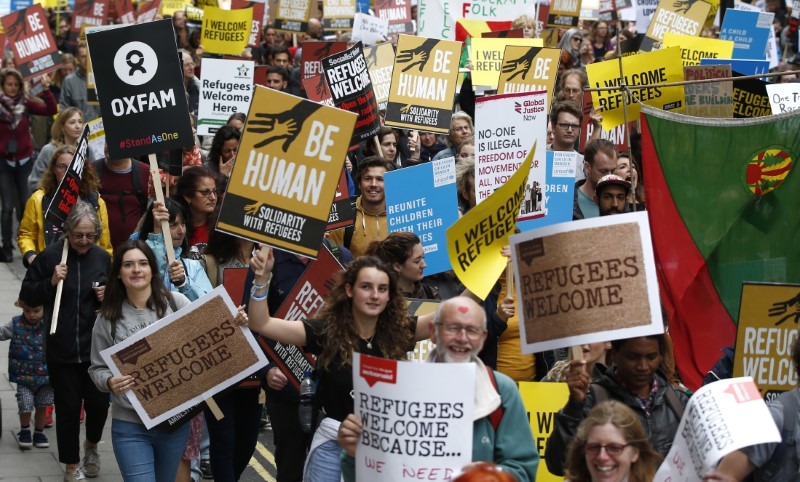By Guy Faulconbridge and Marton Dunai
LONDON/BUDAPEST (Reuters) - Britain has raised concerns with Hungary over a description of areas of London, Paris and Brussels as "no-go" areas dominated by illegal immigrants who increase the risk of militant attacks.
Ahead of an Oct. 2 referendum on whether to reject European Union migrant quotas, Hungary released an official leaflet setting out the government's case for voting "No", including its views on the impact of migration on major Western cities.
In one section, under the title "Forced resettlement poses a threat to our culture and traditions", the leaflet includes a map of Europe detailing -- in red -- what it said were no-go areas where the authorities could not keep control. Cities so identified included London, Paris, Brussels and Berlin.
Other pages of the leaflet include a section on how "Illegal immigration increases the terror threat".
"Immigrants mostly come from areas where European countries are carrying out military actions. This greatly increases the security risk," the Hungarian leaflet said. "Terrorists deliberately and in a well-organised fashion take advantage of the lack of control to melt into the crowds of immigrants."
Britain's embassy in Budapest raised concerns about the leaflet with the Hungarian government, whose head, Viktor Orban, says the EU should round up and deport all illegal immigrants.
"This leaflet is clearly inaccurate," a spokesman for Britain's Foreign Office said. "There are no areas in the UK in which the laws of the UK cannot be enforced."
London, the European Union's biggest city by population, is sometimes portrayed abroad as a tense, immigrant-dominated capital awash with a mix of poor immigrants, highly paid bankers and wealthy foreign oligarchs.
Many Londoners, including mayor Sadiq Khan, say such portrayals are false. Khan says London has benefited from immigration and portrays the city as a beacon of tolerance, cohesion and integration.
Donald Trump, who is now U.S. Republican presidential nominee, said last year that parts of London and Paris were now so radicalised they could no longer be policed by officers, who feared for their lives.
That claim was denied by London police.
Earlier this month, state-owned Air China withdrew an in-flight magazine that warned visitors to be careful in parts of London populated by members of ethnic minorities.

"Precautions are needed when entering areas mainly populated by Indians, Pakistanis and black people," the state-owned airline's Wings of China magazine said in an article offering advice to visitors to London.